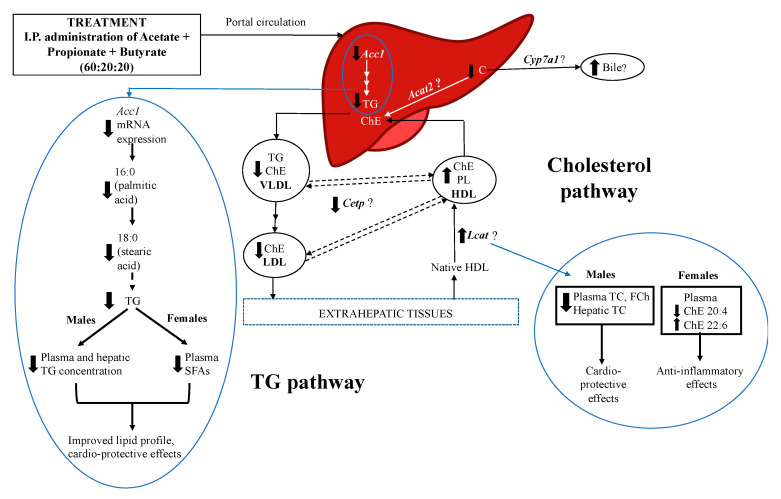Figure 6.
Proposed pathway by which SCFAs regulate lipid metabolism in a sex-specific manner in Long–Evans rats. Acetate, propionate, and butyrate, when administered intraperitoneally in a 60:20:20 ratio, enter portal circulation and reach the liver. Upon reaching the liver, SCFAs decrease the mRNA expression of Acc1, thereby decreasing plasma and hepatic TG levels in males, while altering TG species composed of saturated fatty acids (SFAs) in females; these alterations may elicit cardio-protective effects. SCFAs likely alter the lipid and fatty acid composition of lipoproteins, which may influence the activity of associated enzymes, such as Lcat and Cetp, and be responsible for reduced levels of plasma TC and FC in males. Although no changes were observed in Cyp7a1 gene expression, it is possible that the bile acid production pathway is affected by SCFAs. SCFAs reduced the amount of arachidonic acid (n-6 PUFA), while increasing the amount of docosahexaenoic acid (n-3 PUFA) in ChE in only females, suggesting an anti-inflammatory effect. Overall, SCFAs may provide beneficial health effects to target metabolic disorders in both males and females via targeting the regulation of lipids and lipoprotein metabolism. Acat—acyl CoA:cholesterol acyl transferase, Acc1—acetyl CoA carboxylase, Cetp—cholesteryl ester transfer protein, ChE—cholesteryl esters, Cyp7a1—cholesterol 7a hydroxylase, FCh—free cholesterol, FFA—free fatty acids, HDL—high-density lipoprotein, I.P.—intraperitoneal, Lcat—lecithin cholesterol acyltransferase, LDL—low-density lipoprotein, PL—phospholipids, SCFAs—short-chain fatty acids, TC—total cholesterol, TG—triglycerides. Up and down arrows indicate an increase and decrease, respectively.

